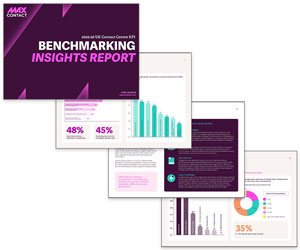As we come to the end of 2024, we asked our industry experts “what’s in store for 2025?” and they delivered!
From new industry benchmarks, the skills agents will really need, and how technology is redefining the art of the possible, 2025 is set to be an even more exciting year than 2024.
29 Contact Centre Predictions for 2025
1. We’ll Get Ever Closer to the Vision of Serving Three Different Types of Customers

In 2025, we’ll get ever closer to the 2030 vision of there being three different types of customers to serve:
Consumers – Firstly, we’re not disappearing. In fact, the pocket of these consumers is going to go up by more than 50% to more than $90 trillion by 2030.
Digital Twin – We’ll be adding to that with the digital twin of the consumer, a fairly new concept whereby you could use data to create a twin of a consumer; for example, creating personas that best amplify a group of customers to better anticipate their needs.
Machine Customers – This is the idea that, by 2030, 25% of that $90 trillion in consumer purchasing decisions will be made by machines, some of which we’re already seeing today, such as alerts as to when your car needs a service and offering to book it for you – albeit this is a very controlled example.
Contributed by: Steve Blood, VP of Market Intelligence and Evangelism, Five9
2. IVR Systems Will Be Wiped Out

2025 will mark the beginning of the voice AI agent era. IVR systems will be almost completely wiped out as voicebots capture a significant market share from text chatbots.
It gets even more exciting. As voicebots are advancing so quickly and guiding agents during calls to suggest what to say or do, why not let the AI speak directly to customers?
Quite simply, the adoption of voice AI agents will transform the industry.
Contributed by: Gennadiy Bezkorovayniy, CEO, MiaRec
3. Virtual Agent Technology Will Allow Contact Centres to Be Open 24/7

As highlighted in the Genesys 2025 Buyers Guide for Contact Centres, there will be a lot of investment in virtual agent technology, which will allow contact centres to be open 24/7 –regardless of channel.
Customers will be empowered to self-serve with a more conversational experience with the virtual agent.
Then, if they need some additional support from a human agent, the copilot technology will assist the agent with the full context of the interaction so far.
Contributed by: Steve Barratt, AI Experience orchestration-EMEA, Genesys
4. Pointless AI Solutions That Don’t Pull Their Weight Will Be Filtered Out

2024 was the year of ‘let’s automate lots of stuff’. 2025 will be the year of ‘let’s automate stuff well’. We’ve had long enough now for people to gauge how well their AI deployments are doing.
There’ll be a kind of ‘natural selection’ where the pointless AIs that don’t pull their weight are filtered out.
This will create an interesting situation where some businesses increase how much they automate while others double down on human service (even though it’s getting increasingly difficult to hire agents).
Both are valid because:
- AI can do repetitive tasks all day without mistakes.
- Human agents add a premium feel to your customer service, especially when everyone else automates; and anyway, the right to talk to a human may be mandated by the EU by 2028.
The realization that’ll drive CX strategy is that humans and AIs are both indispensable in their own ways.
Contributed by: Pierce Buckley, CEO & Co-Founder, babelforce.
5. The Hyper-Connected Contact Centre Will Be the New CX Standard

I know we’ve been talking about this for a long time, but contact centres really need to walk the talk when it comes to omnichannel and connected, frictionless journeys.
Think UC, true omnichannel, virtual assistants, AI-enabled knowledge systems, and backend systems integration – all coming together for improved FCR and AHT and driving that optimal customer experience.
Contributed by: Steve Nattress, Vice President of Product Management, Enghouse Interactive
6. Time and Attendance (T&A) Will Be More Relevant Than Ever Before

Contact centres are moving to a world where employees have more and more say in their shifts – and more and more of them work remotely. Meanwhile, the BPO sector continues to grow.
That’s why Time and Attendance will be more relevant than ever before for the contact centre of 2025.
What’s Time and Attendance (T&A)? It’s all about tracking worked time and allocating that time into different categories for payroll, invoicing, etc.
It also lets you define rounding rules that normalize time records, e.g. start time up to 5 minutes late counts as on-time. It helps avoid payroll errors and non-compliance with labour laws on working hours, overtime and breaks. BPOs (outsourcers) also find it useful for client billing.
Contributed by: Chris Dealy, WFM Evangelist, injixo
7. Self-Scheduling Will Empower Even More Agents With Control Over Their Shifts

Over the past year, contact centres adopting self-scheduling have seen notable improvements in agent empowerment and adherence rates, and reduced attrition. However, Calabrio’s latest research reveals that 46% of agents in European contact centres still lack this capability.
In 2025, self-scheduling will become a key trend, marking the first step toward fully automated scheduling systems.
This will empower agents with complete control over their shifts, transitioning contact centres from traditional command-and-control structures to more flexible, agent-driven operations.
Smart technologies, including work location optimization and shrinkage action suggestions, will also play a pivotal role. These tools will not only suggest coaching opportunities but personalize training based on performance data.
Contributed by: Ed Creasey, Vice President of Solution Engineering, Calabrio
8. Supervisors Will Turn to AI-Driven Quality Monitoring and Analytics Tools

Shifting caseloads are intensifying pressure on agents as customers increasingly rely on them for complex resolution, and brands stake their reputation on delivering exceptional CX.
This amplifies pressure on supervisors, who must actively coach ‘all-star’ agents to maintain functional skill balance and support mental resilience.
To meet these challenges, supervisors will turn to AI-driven quality monitoring and analytics tools for deeper insights into workflows, agent performance, and customer sentiment.
These tools will enable the proactive coaching and workflow curation needed to maximize agent value while reducing burnout.
Contributed by: Jean-Pierre Moneyrac, Data Manager, Product Marketing Team, Odigo
9. AI and Automation Will Detect Signs of Vulnerability
In 2025, most UK businesses will leverage AI and automation to analyse all interactions to detect the signs of vulnerability often missed by agents, such as financial distress or emotional strain, allowing companies to intervene with tailored and empathetic human support.
With the UK’s regulatory focus on fair treatment and inclusivity, businesses will increasingly rely on automation to stay compliant across customer service, while leveraging AI insights to deliver compassionate, personalized care where it matters most.
Contributed by: Darren Rushworth, President, NICE International
10. Machine Learning Forecasting Will Drive Better Conversations

Machine learning forecasting is starting to make a real difference to people. The biggest challenge is that we don’t have enough data scientists in place to support it – even though there’s plenty of data there.
However, we’re already starting to see leading organizations dissect and draw out understandings to drive better conversations, so instead of people saying, “the forecast is wrong”, they are empowered to say, “this element is not quite right, so let’s learn from it and do something differently”. That’s going to have the biggest impact into 2025 and beyond.
Contributed by: Phil Anderson, CEO of The Forum
11. Agentic AI Will Complete Tasks Behind the Scenes for Us

As we move into 2025, contact centres are going to become more autonomous and we’re going to hear more and more about agentic AI. This is the concept of virtual agents working in the background for us.
For example, listening into calls and reading transcripts to surface new knowledge articles, or raise new intents and topics to a bot designer.
Contributed by: Seb Reeve, Contact Center Product Director, Business & Industry Copilots (BIC), Microsoft
12. CX Will Be a Key Differentiator in a Competitive Market
When I’m talking to our customers, almost exclusively, customer experience is in their top two or three business priorities.
We’re very much in a world now where customer experience is one of the main things that will help organizations differentiate their business and compete with the companies that they’re up against in their market.
Customer experience in the wider context is a real trend that we’re seeing in all sectors and organizations, and that will continue to be a focus into 2025 and beyond.
Contributed by: Dan Davies, CEO, Maintel
13. Rising Operational Costs Will Drive Increased Interest in Offshore Solutions

The industry faces economic pressures, particularly in the UK, with rising operational costs driving increased interest in offshore solutions.
Success in 2025 will depend on finding the right balance between automation and human interaction, while ensuring technology truly solves customer problems rather than creating new barriers.
Contributed by: Ben Booth, CEO, MaxContact
14. It Will Be Ever More Important That Contact Centres Pay Good Money to Agents for Handling More Complex Work

We’re going to see even more contacts being handled by AI, taking away the easy-to-answer questions and leaving our human experts with only the complex queries.
As the job gets tougher, it will be increasingly important for contact centres to pay agents good money to recognize the value they bring to handling this complex work.
As we head into 2025, it’s clear that contact centres need a customer-led strategy with AI playing a part – not forgetting that human experts play a unique role in delivering great CX.
Contributed by: Dan Eddie, Director Of Customer Service, Simplyhealth
15. Enhanced Tools Will Replace Traditional Time-Based Metrics

The technical landscape of contact centres in 2025 will focus heavily on system integration and data accessibility.
Currently, many contact centres operate with 3–4 disconnected systems, compared to single systems a decade ago. This fragmentation creates significant challenges in tracking customer journeys and measuring true resolution rates.
Key developments will centre on unified platforms that connect data across channels – from email and voice to webchat – enabling accurate measurement of cross-channel interactions and first contact resolution.
We’ll also see enhanced tools for measuring real customer outcomes rather than traditional time-based metrics.
Contributed by: Matthew Yates, VP Engineering, MaxContact
16. We’ll See Growing Demand for Rapport Building and Empathy Skills

We’re seeing a real interest and demand in the skills required to deal with vulnerability, as well as an increase in organizations that are not necessarily regulated or in financial services wanting to follow that framework.
Why? People are realizing that the skills that underpin supporting vulnerable customers – such as building rapport and empathy – are coming to the fore, particularly as technology is now taking over the more transactional calls and humans are left with the complex. I see that continuing throughout 2025.
Contributed by: Nicola Callan, Founder & Director, Boost HR
17. People Will Want Even More From the Tech They Already Have in Place

In 2024, contact centre leaders have been focused on sweating their existing assets. As we move into next year, this is going to accelerate, as people will continue to make sure they’re getting the most from their existing technology investments.
So much so that we’ll see more specialist roles coming into the planning team, for example, where people are given specific responsibility for the WFM systems in place and getting the most out of them.
Contributed by: Dave Vernon, Director of Membership & Best Practice, The Forum
18. People Will Approach AI With Far More Clarity and Purpose

2024 has been a year of cautious change and almost a bit too much choice and information.
Looking ahead, we’re going to see leaders with a lot more clarity on what solution is right for them.
Contact centres will increasingly be asking themselves: “how does that work for my business?” and “what will it do for my CX metrics?” – all to offer frictionless experiences that improve the customer journey.
Contributed by: Mark Allaway, Evosa
19. People Will Take a Step Backwards to Get Their Ducks in a Row – Before Layering on AI

As 2025 takes shape, everybody in the contact centre industry is going to be more aware of the importance of getting their processes and data into a good place BEFORE they layer on AI.
We’ll see people taking a step backwards to get more organized and then looking at what AI can bring to the party.
Contributed by: Steve Hindley, iNarrator
20. Contact Centres Are Going to Be Doing More With Less – With the Help of Technology

In our 2024 North East Contact Centre Award entries, we saw people doing more with less in these very challenging times – with a particular focus on smarter technology investments and strategic partnerships.
We’ve also seen lots of mental health and diversity initiatives coming through, with equality and inclusion becoming the norm and setting a new standard in contact centres – as opposed to being seen as a “nice to have”.
We’re expecting to see even more of this into 2025.
Contributed by: Sarah Hunt, Head Judge at the North East Contact Centre Awards
21. The AI Hype Will Continue to Give Way to Tried-and-Tested Use Cases

I’m really happy to say that the AI hype that we’ve seen is now starting to subside. It’s now more about use cases and how technology can assist agents and customers.
The industry is learning that we can’t replace human agents! So next year, we will see a focus on how we optimize agents on the frontline, how that experience can be improved and how technology can help agents – instead of being preoccupied with driving revenue and cutting costs.
Contributed by: Alex McConville, Contact Centre Consultant and author of ‘Diary of a Call Centre Manager’
22. The Uplevelling of Human Skill Sets Will Impact School Curriculums

As customer service becomes fully automated, CX roles will transform significantly, going beyond traditional contact centres.
CX professionals will take on strategic roles, managing AI oversight to maintain service quality and accuracy, while also dedicating more time to customer relationship management and complex issue resolution.
As the roles in customer service evolve, we will see investment move from human-led CX interactions to reskilling the workforce to become AI prompt engineers and strategy planners. This uplevelling of human skill sets will also impact school curriculums and business learning programmes.
Contributed by: Barry Cooper, President, CX Division, NICE
23. AI-Enabled VoC Insights Will Be the CX Game Changer
Surveys and Net Promoter Scores provide great information, but AI-enabled Voice of the Customer (VoC) insights will be the CX game changer for 2025.
With these insights, organizations can gather data across 100% of their customer engagements to help understand – both at a high level and in detail – what their customers really think and need. To experience a real return on their investment (ROI), organizations must then act on the uncovered insights.
Contributed by: Steve Nattress, Vice President of Product Management, Enghouse Interactive
24. Contact Centres Will Increasingly Adopt AI-Ready Practices
In 2025, practicality and ROI will lead the AI agenda, with a focus on proven applications, establishing meaningful AI metrics and embracing achievable AI – use cases that genuinely reduce call volumes, boost agent productivity and enhance omnichannel qualification and routing.
This shift in priorities will also drive organizations to adopt AI-ready practices, including clean, unified, and validated data, while embedding change management into the deployment process rather than treating it as an afterthought.
Contributed by: Jean-Pierre Moneyrac, Data Manager, Product Marketing Team, Odigo
25. Companies Will Prioritize AI Solutions That Are Designed With Transparency

With stricter regulations and heightened attention on ethical AI and data use locally, companies will prioritize AI solutions that are designed with transparency, accountability, and compliance in mind.
Purpose-built AI will offer the assurance of governance frameworks tailored to specific industries like financial services, regions like the UK and business areas like customer service, making it the preferred choice for those looking to balance innovation with responsible AI deployment.
Contributed by: Darren Rushworth, President, NICE International
26. Smaller Contact Centres Are Going to Level the Playing Field Massively in 2025

When you look at what AI and the cutting-edge tools allow for a modern data-driven contact centre to do, including workforce management, efficiencies and scheduling to customer engagement and post-contact analysis, it really does give the smaller contact centres a chance to level the playing field in terms of what they provide.
Contributed by: Lisa Orford, Vice President for Contact Centre, 8×8
27. Remote and Hybrid Working Will Still Be a Thing

Remote and hybrid working will continue and the UK market will continue to evolve as a result of this. It’s created an interesting space – one that we think will keep expanding over the next few years – where you need people who don’t work in a contact centre to have access to contact centre-like tools and abilities, especially subject-matter experts.
Of course, this level of working means companies need to be cloud-enabled and, so far, only 50% of UK businesses are there.
Contributed by: Chris Angus, Vice President for Contact Centre Engagement, 8×8
28. Enhanced Predictive Capabilities
AI-driven predictive analytics will empower contact centres to anticipate customer needs and behaviours, enabling proactive outreach that solves problems before they arise.
Proactive outreach will shift from a ‘nice-to-have’ to an essential CX strategy by 2025. This shift will transform CX from reactive to anticipatory, enhancing customer loyalty and satisfaction. Post-call surveys will also become obsolete as AI enables real-time tracking of customer interactions.
29. Happier Employees Drive Better Outcomes

AI-powered tools like proactive knowledge base retrieval, automated call summarization, and AI-led coaching will create a more supportive work environment for agents.
These innovations will not only reduce agent attrition but also improve job satisfaction. Happier, more engaged agents foster positive customer interactions, leading to higher customer loyalty – a win for employees, customers, and businesses alike.
Contributed by: Ben Neo, Head of Contact Center and CX Sales EMEA, Zoom
Want to Hear More Predictions for 2025?
Watch our webinar replay on The Future of Contact Centres in 2025.
For more great insights and advice from the experts, read these articles next:
- Create the Perfect Contact Centre by 2030
- Evolution of CCaaS – What’s Next?
- The AI Revolution – How Contact Centres Are Adapting
Author: Megan Jones
Reviewed by: Jo Robinson
Published On: 4th Dec 2024 - Last modified: 20th Aug 2025
Read more about - Technology, 8x8, Alex McConville, babelforce, Barry Cooper, Ben Booth, Calabrio, Chris Angus, Chris Dealy, Dan Eddie, Darren Rushworth, Dave Vernon, Ed Creasey, Editor's Picks, Enghouse Interactive, Five9, Genesys, Jean-Pierre Moneyrac, Lisa Orford, Maintel, Mark Allaway, Matthew Yates, MaxContact, MiaRec, NiCE, Nicola Callan, Odigo, Peopleware, Phil Anderson, Pierce Buckley, Predictions, Sarah Hunt, Seb Reeve, Steve Barratt, Steve Blood, Steve Hindley, Steve Nattress, The Forum, Top Story, Zoom




















